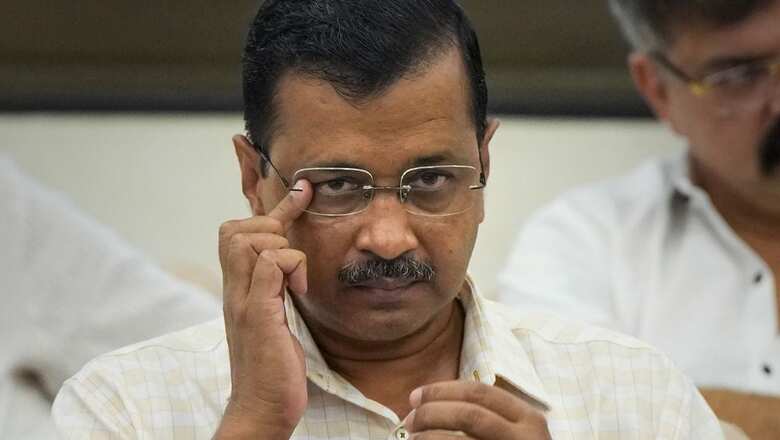
views
The Aam Aadmi Party (AAP) has claimed the Directorate of Enforcement (ED) may arrest Delhi Chief Minister and party convener, Arvind Kejriwal, soon. Citing sources, AAP leader and Delhi’s Law and PWD Minister, Atishi, said that Delhi CM’s residence is also likely to be raided by the probe agency.
AAP’s big claim came after Kejriwal skipped the probe agency’s summon in connection with the Delhi Excise Policy case on Wednesday.
Kejriwal Skipped 3rd ED summon
Calling it ‘illegal’, Kejriwal asked ED to withdraw its notice against him and refused to come for the interrogation. However, he maintained that he was ready to cooperate with the probe.
This was the third time when the ED summoned the Delhi CM in connection with the case after he refused to appear before the probe agency on November 2 and December 21 last year.
A non-bailable warrant (NBW) can be issued against an individual after three ignored ED summons, forcing them to appear before a court. Failure to do so can lead to their arrest.
Delhi Fortified
Since yesterday evening, security has been increased around the AAP office and the Chief Minister’s residence in Delhi. Kejriwal’s staff members alleged that they were not being allowed to enter the Chief Minister’s residence.
AAP sources claimed that the roads leading to Arvind Kejriwal’s residence in Delhi were blocked and police personnel deployed at all gates as the ED was “gearing up” to raid and arrest the chief minister.
The party alleged the probe agency intended to arrest the Chief Minister and wanted to prevent him from election campaigning.
The Delhi Police, however, said the security around the CM house was beefed up to “manage” media persons who have gathered there since Wednesday after party leaders claimed that Kejriwal would be raided and arrested.
What Was the Delhi Excise Policy?
In 2021, the AAP government introduced a series of changes in its liquor excise policy, which included, the cessation of government-owned liquor stores with the issuance of store operation licenses to private entities, lowering of the legal drinking age from 25 to 21 years, and separate registration criteria for liquor brands on account of factors such as pricing and sales performance in areas outside of Delhi. It also proposed an increase in the annual liquor vending license fee from Rs 8 lakh to Rs 75 lakh.
The Delhi government also withdrew from the liquor retail business, granting licenses to 849 private vendors through competitive bidding.
However, soon after the policy came into force, it was marred with allegations of corruption and favouritism in the licensing process by the Opposition.
Adding to AAP’s trouble, Delhi’s Lieutenant Governor VK Saxena initiated an investigation into the new excise policy. Based on a report from Delhi’s top bureaucrat, Saxena formally called for a Central Bureau of Investigation (CBI) probe.
Amid all the drama, the government announced the rollback of the excise policy.
Delhi Liquor Policy Case: A Timeline
- November 17, 2021: Delhi government implements Excise Policy 2021-22.
- July 8, 2022: Chief Secretary of Delhi Naresh Kumar submitted a report alleging irregularities in the excise policy 2021-22 to Lieutenant Governor VK Saxena.
- July 22, 2022: Lieutenant Governor VK Saxena recommends a CBI probe into the alleged irregularities in the formulation and execution of the Delhi Excise policy.
- July 31, 2022: The Delhi government scrapped the policy after it came under scanner.
- August 17, 2022: The Central Bureau of Investigation (CBI) files a case against 15 persons, including former Delhi deputy chief minister Manish Sisodia, in connection with various irregularities in the excise policy.
- August 19, 2022: CBI raids Manish Sisodia’s house.
- September 6, 2022: The Enforcement Directorate conducts its first round of raids at around 40 locations in connection with the alleged scam in the Delhi excise policy.
- September 16, 2022: The ED conducts a second round of raids on premises linked to liquor businessmen, distributors, and supply chain networks in Nellore and some other cities in Andhra Pradesh, Karnataka, Tamil Nadu, and Delhi-NCR in connection with the case.
- October 17, 2022: Manish Sisodia is quizzed at the CBI headquarters for eight hours.
- November 5, 2022: ED interrogates Sisodia’s personal assistant Devendra Sharma.
- November 25, 2022: The CBI files a charge sheet against seven accused in the case.
- November 30, 2022: ED arrests Amit Arora a Gurgaon-based businessman and another close aide of Sisodia in connection with the case.
- December 2, 2022: The CBI issues summons to Telangana CM KCR and BRS MLC Kavitha for questioning in connection with the alleged scam in the Delhi excise policy.
- December 22, 2022: ED names BRS MLC Kavitha in its chargesheet.
- January 6, 2023: ED files a second chargesheet naming 12 accused. However, the probe agency skips Sisodia’s name citing an ongoing investigation.
- January 14, 2023: CBI officials search Manish Sisodia’s office once again.
- February 18, 2023: CBI summons Sisodia again for questioning.
- February 26, 2023: CBI arrests Sisodia.
- February 27, 2022: The CBI gets five-day custody of the Delhi Deputy CM for questioning.
- February 28, 2023: Sisodia resigns from Delhi Cabinet.
- October 1, 2023: AAP leader Sanjay Singh was arrested in connection with a money laundering case pertaining to the alleged scam in the Delhi excise policy.




















Comments
0 comment